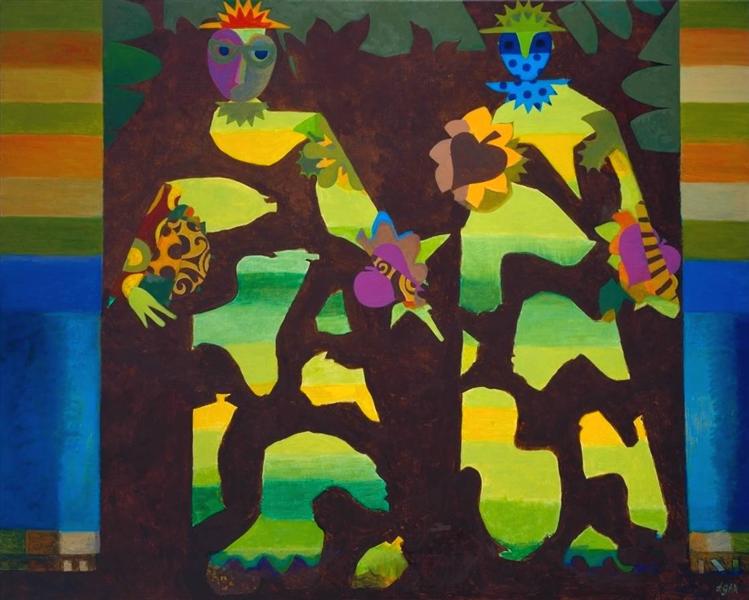Figures in a Garden
Tate Modern, London, UK
Eileen Agar, 1981
Figures in a Garden was originally exhibited under the title October and later, after some additions were made to the canvas, The Dark Wood. It shows two figures dressed in elaborately decorated masquerade costumes. They stand against a dark leafy background and their brightly coloured bodies are fragmented as though caught in the shadows. Agar had studied art at the Slade School in London before moving to Paris, where she was befriended by the artists Pablo Picasso (1881-1973), Henry Moore (1898-1986), Man Ray (1890-1976), the novelist Evelyn Waugh (1903-66) and the poet Ezra Pound (1885-1972). Two years later she returned to London and was hailed as an important figure by the new Surrealist movement. Her work at that time included collage and sculpture which incorporated found objects. In 1965, Agar began to use acrylic paint. She liked its ease of handling, the speed with which it dried and the fact that it was a new medium. 'After four hundred years of oil painting, I felt artists should move on to something else' she said. 'It was a period of constant experiment, of testing the effects of new pigments, new colour combinations … In acrylics, I had found what I considered to be an ideal medium, and I wanted both to master it and to stretch it.' (Simpson, Gascoyne and Lambirth, p32). In the late 1960s, she was asked to produce ten large canvases for a major retrospective exhibition at the Commonwealth Institute in 1971. She used the opportunity to develop her use of this newly adopted medium. The large colourful canvases were constructed by laying amorphous patches of colour on the canvas in a manner reminiscent of her earlier collages. They played with illusion in much the same way, tricking the eye into seeing more than is placed before it. In his catalogue introduction to the exhibition at the Commonwealth Institute, Roland Penrose (1900-1984), an artist, collector and champion of the Surrealist movement in Britain, noted his reaction to these paintings: "I find that I am led into deep sensations of time and space in some recent paintings where sharply delineated forms hover in darkness so that the blackness that surrounds them is alive in its own right and others where transparent forms with softer edges merge together creating new volumes and a magic sense of depth, a vortex of colour which carries the eye with rhythmic motion into a realm which transcends our limited field of observation". (Chloe Johnson)
